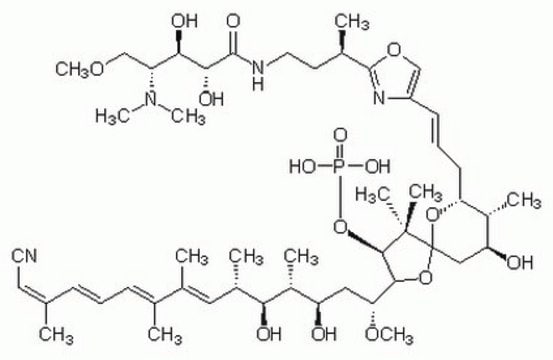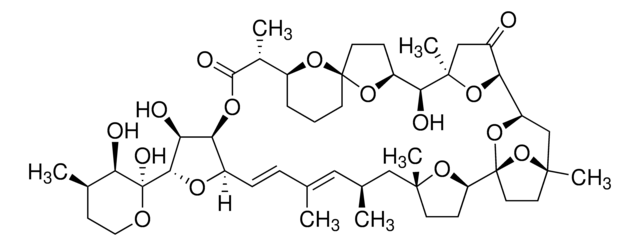O8010
Okadaic acid ammonium salt from Prorocentrum concavum
≥90% (HPLC), solid
Synonym(s):
OA
About This Item
Recommended Products
biological source
plant (Prorocentrum concavum)
Quality Level
Assay
≥90% (HPLC)
form
solid
color
white
solubility
H2O: 0.1 mg/mL
DMSO: soluble
ethanol: soluble
storage temp.
−20°C
SMILES string
[H][N+]([H])([H])[H].[H][C@]1(CC[C@@H](O)[C@@]2(O[C@@H](CC(C)=C2)C(C)\C=C\[C@@]3([H])CC[C@@]4(CCC5O[C@H]([C@@H](O)C[C@H](C)C6O[C@@]7(CCCCO7)CC[C@H]6C)C(=C)[C@@H](O)[C@]5([H])O4)O3)O1)C[C@@](C)(O)C([O-])=O
InChI
1S/C44H68O13.H3N/c1-25-21-34(55-44(23-25)35(46)12-11-31(54-44)24-41(6,50)40(48)49)26(2)9-10-30-14-18-43(53-30)19-15-33-39(57-43)36(47)29(5)38(52-33)32(45)22-28(4)37-27(3)13-17-42(56-37)16-7-8-20-51-42;/h9-10,23,26-28,30-39,45-47,50H,5,7-8,11-22,24H2,1-4,6H3,(H,48,49);1H3/b10-9+;/t26-,27-,28+,30+,31+,32+,33?,34+,35-,36-,37?,38+,39-,41-,42+,43-,44-;/m1./s1
InChI key
ZBOMSHVRJSJGNR-JBNKPAQWSA-N
Biochem/physiol Actions
Signal Word
Danger
Hazard Statements
Precautionary Statements
Hazard Classifications
Acute Tox. 3 Dermal - Acute Tox. 3 Inhalation - Acute Tox. 3 Oral - Skin Irrit. 2
Storage Class Code
6.1C - Combustible acute toxic Cat.3 / toxic compounds or compounds which causing chronic effects
WGK
WGK 3
Certificates of Analysis (COA)
Search for Certificates of Analysis (COA) by entering the products Lot/Batch Number. Lot and Batch Numbers can be found on a product’s label following the words ‘Lot’ or ‘Batch’.
Already Own This Product?
Find documentation for the products that you have recently purchased in the Document Library.
Customers Also Viewed
Our team of scientists has experience in all areas of research including Life Science, Material Science, Chemical Synthesis, Chromatography, Analytical and many others.
Contact Technical Service










